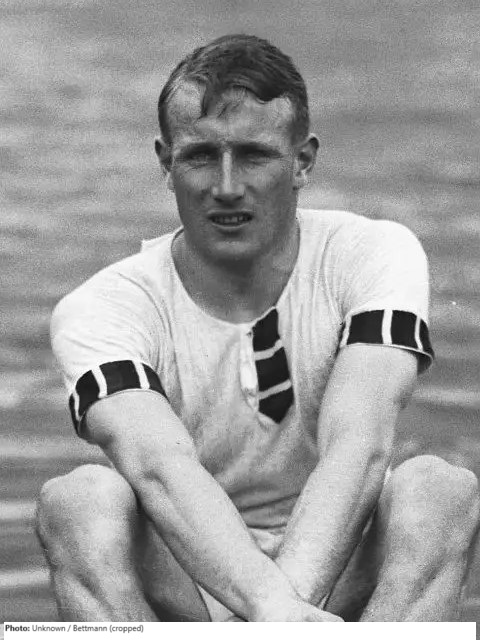Generally considered to be one of the two finest British oarsmen ever (with Stephen Redgrave), Jack Beresford was born into a rowing family with his father, Julius Beresford, having won an Olympic silver medal in the coxed fours, outriggers in 1912. Jack first showed his inherent talent at Bedford School where he stroked the eight and also captained in the rugby football XV. After serving in the Liverpool Scottish Regiment, his Olympic career began in 1920 when he placed second to the American, Jack Kelly, Sr., in the single sculls. At the Paris Olympics four years later, Beresford met another fine American sculler, Garrett Gilmore, and after losing to Gilmore in the heats Beresford reached the final via the repêchage which had been introduced into Olympic competition that year. In the final, Beresford gained revenge for his earlier defeat in the heats by defeating Gilmore quite comfortably to win the first of his three Olympic gold medals. At the 1928 Olympics, Beresford demonstrated his versatility by winning a silver medal in the eights. In the 1930 British Empire Games he represented England and won the silver medal in the single sculls competition. He then won a gold in the coxless fours in 1932, won his third Olympic gold medal in the double sculls in 1936 and was in training for a sixth Olympic appearance when war intervened in 1940. Until Redgrave duplicated the feat, no other British oarsman came close to matching his record of competing in five Olympics and winning a medal in each. Away from the Olympics his record was no less impressive; he won the Wingfield Sculls seven consecutive years (1920-26), the Diamond Sculls four times and the Grand, the Stewards’ and the Silver Goblets twice each. Beresford, who rowed for the Thames, Kingston and Leander clubs, was awarded the Olympic Diploma of merit in 1949. He later managed the British rowing team at the 1952 Olympics, and in 1960, Jack Beresford was awarded a CBE for his services to rowing and that same year his nephew Michael Beresford took part in the coxless fours at the Rome Olympics. This meant that the Beresford’s became the first British family to have three generations represent them at the Olympic Games.
Widely known as Jr. but there was no Jack Beresford, Sr.

 Great Britain
Great Britain GBR
GBR GBR
GBR GBR
GBR GBR
GBR GBR
GBR GBR
GBR